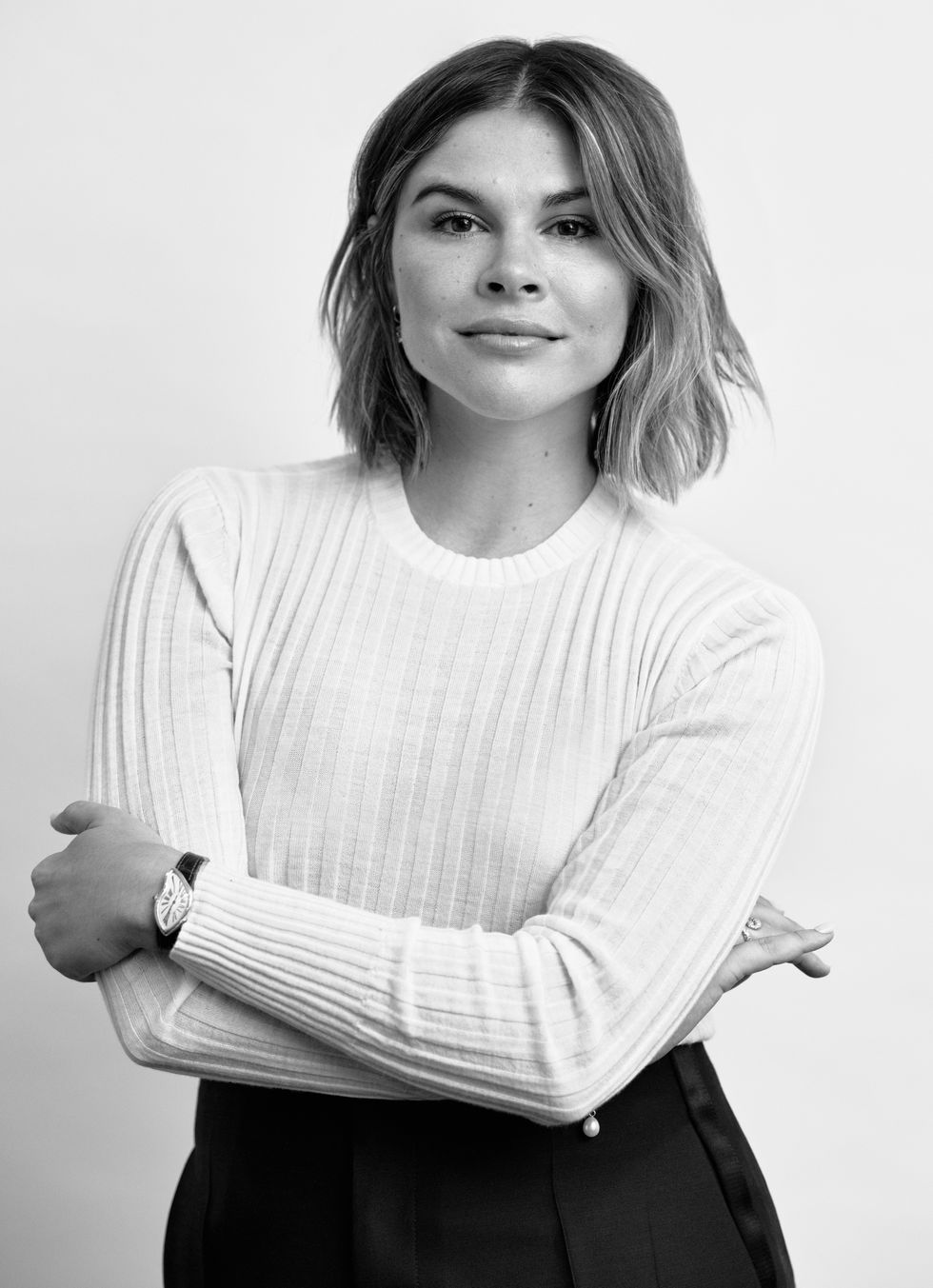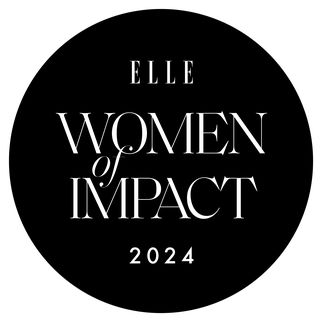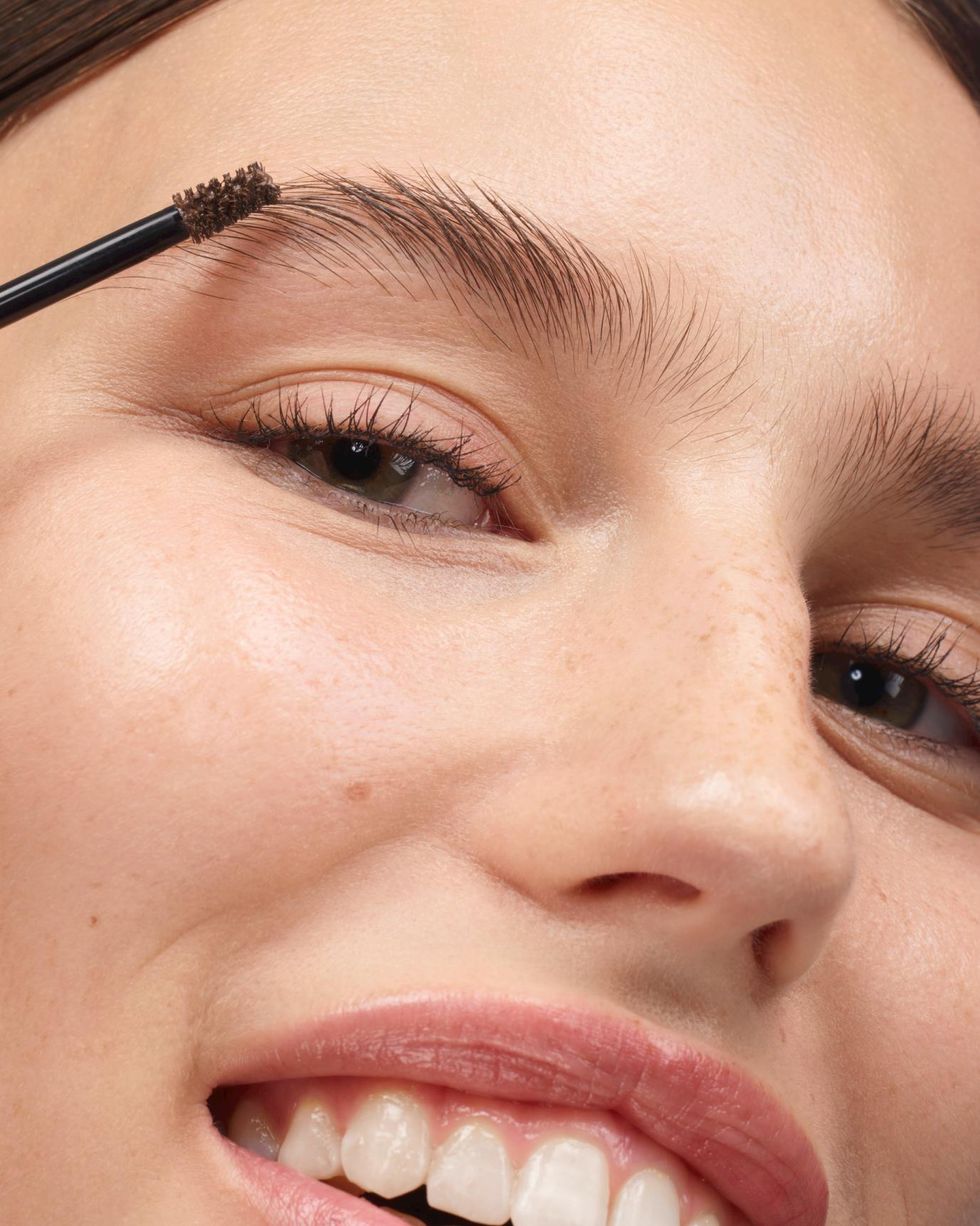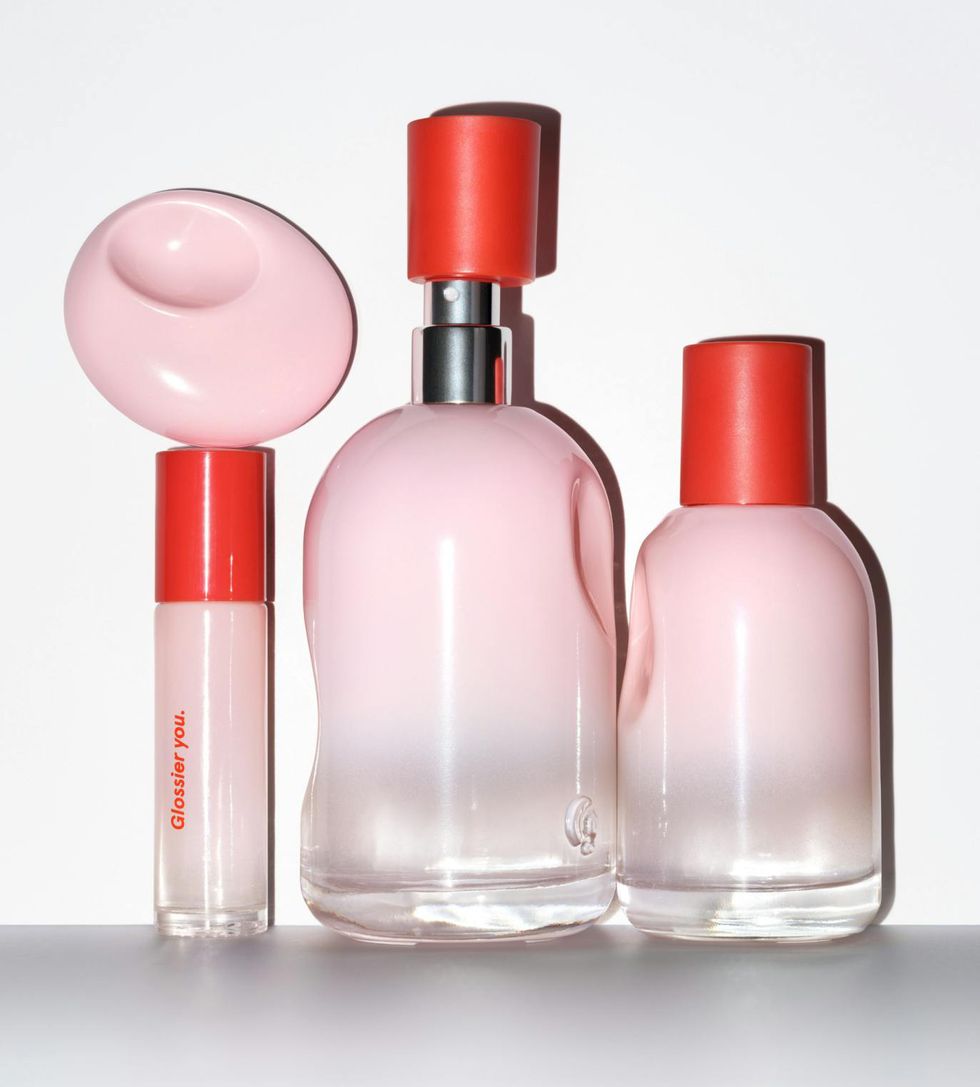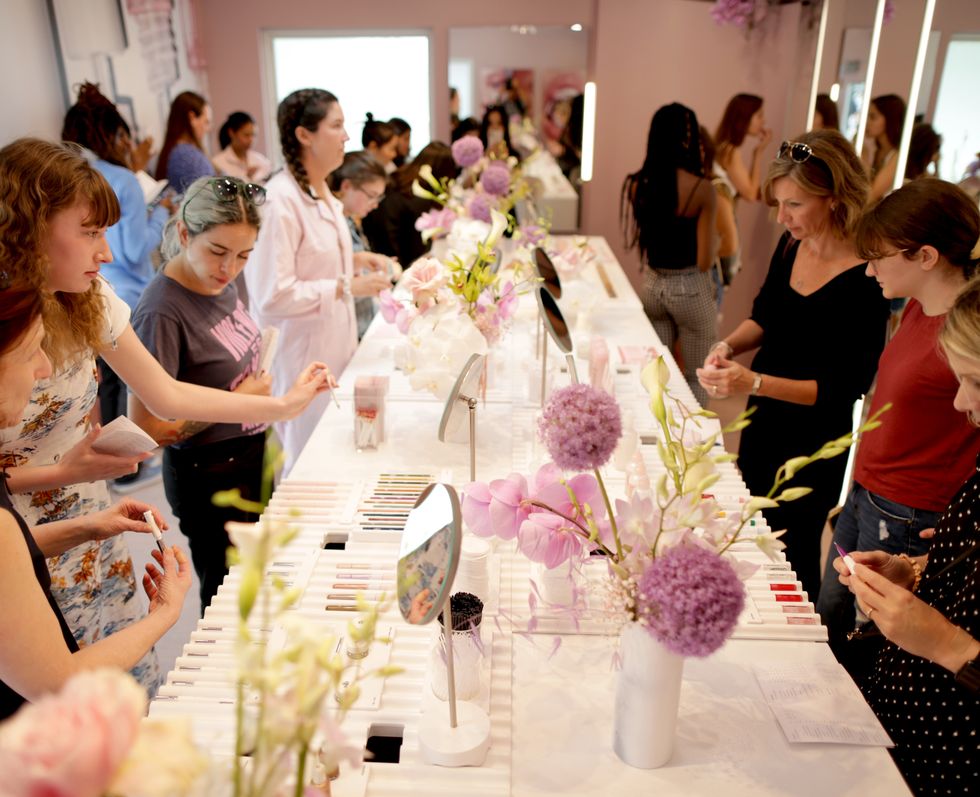For Emily Weiss, founder of the billion-dollar beauty brand Glossier, motherhood can be summed up in a word: relinquishing. It’s “this relinquishing of expectation, of control, of plans,” she says. Giving birth to her daughter, Clara, in 2022 marked a transition from “spending most of my adult life being quite organized, ambitious, fast, decisive, and I won’t say controlling, but—wink, wink,” she says, leaning in conspiratorially. “Being that kind of woman and then becoming a mom, it’s sort of the polar opposite,” she says. “You could read a million books and still feel unprepared.”
Weiss is someone who is used to being prepared for everything. In fact, she’s generally operating several tactical steps ahead of the rest of us. During our overlapping time at a fashion magazine, she helped style sheer shirts on a light box for a story I was writing on a new designer; as I recall, she woke up at dawn to apply herself to the task. Her late-2000s time in the magazine world, at Vogue, W, and Teen Vogue, brought her into contact with supermodels and stylists, and Weiss cannily realized that people might want to see inside the medicine cabinets and vanity drawers of the notable—early subjects for her beauty website, Into the Gloss, included Karlie Kloss and Lauren Santo Domingo. (This was when people were still saying, of Instagram, “Who cares what you ate for breakfast?” Unboxings, hauls, “Get ready with me,” and “What’s in my bag?” features were just a glint in a future influencer’s ring light–encircled eye.)
The site spawned a brand, Glossier, launched in 2014 with four minimalist, you-but-better products. It was a new vision of natural beauty that felt, if not revolutionary, at least refreshing. As Glossier grew, a signature aesthetic emerged: The strong brows that I’d been made fun of for having were suddenly something to emphasize with Boy Brow; shiny skin was something to highlight, not suffocate in matte powder.
Looking back now, Weiss says, “The thing that bothered me about beauty and fashion was how seriously it took itself and how exclusionary it felt, as though I needed to have a certain last name, amount of money, skin tone. That was such a burning fire inside of me and still is today, which is like, ‘You don’t need a ticket for entry to belong here. Everyone belongs. And how do we make this fun and inclusive and help you feel like you look good?’” (“You look good” is, in fact, a slogan bisecting countless mirror selfies at its stores; Weiss is nothing if not on-message.)
Not everyone found the message of inclusion quite as persuasive. Amid the racial reckoning in the summer of 2020, Glossier created a fund to support Black-owned beauty brands. However, a group of former retail staffers cited patterns of racism and transphobia in the company’s stores. Weiss issued public apologies on Glossier’s site and on her personal Instagram account.
Early in the pandemic, she’d gotten engaged and had relocated, temporarily, to the calmer shores of Malibu. Even after stepping down as CEO in 2022, becoming executive chairwoman and retaining her founder title, she remained the subject of endless press—as well as a 2023 book, Glossy, by Marisa Meltzer, which served as a dual chronicle of the company and Weiss herself (and will reportedly be adapted by Amazon MGM Studios as a TV series).
In a cozy-looking sweater that matches the Glossier NYC office’s greenery, her brown hair pulled back, Weiss still presents as type A, but she says she’s become more open-minded—to change, to zigging and zagging. To relinquishing. Take the whole Sephora thing: “I really used to think that Glossier would be direct-to-consumer forever. Fast-forward to 2022, and the number one comment on any TikTok was, ‘Will you please sell Glossier in Sephora?’” One year later, she says, they’ve done $100 million in sales at the retailer’s North American locations. So, I ask, Weiss goes against conventional wisdom and reads the comments? “Comments are almost always right,” she insists, citing something she read about Jeff Bezos. “When he’s shown anecdotes or data, he [usually] believes the anecdote.”
TikTok is also where Glossier You, the brand’s seven-year-old fragrance with notes of peppercorn and white florals that purports to smell like “you,” took off like wildfire. According to Weiss, it’s now the number-one-selling perfume at Sephora. “It’s not Chanel, not Gucci, not Dior—it’s Glossier You,” Weiss says proudly, calling it a “complete grassroots success story” and adding that the company didn’t even invest in marketing for it until recently. “I really believe,” she adds, “that this could be the next Chanel No. 5.”
Given that Glossier was often termed a millennial darling in the press, it might be surprising to see it take such a foothold with Gen Z. But to hear Weiss tell it, Glossier never belonged to a specific generation. “I don’t think I’ve ever said that we’re a millennial brand. The ambition and vision was always that it was a multigenerational, psychographic, not demographic, brand,” she says, likening it to Nike. “When I’m standing in line outside a Glossier store or walking by a [display] in Sephora, it’s everyone from an eight- or nine-year-old girl to a 45-, 50-year-old woman who’s shopping.”
Weiss now works with an all-female executive team that includes CEO Kyle Leahy, previously of Cole Haan, and CCO (and Chanel alum) Chitra Balireddi. She calls it both “a dream come true” and “unfortunately a total anomaly….Ironically, there are very few female CEOs in beauty. I can’t think of a single all-female executive team with seven or eight C-suite leaders at a beauty company of our scale.” If she had to give her past self any advice, it would be, “Always surround yourself with people who have done what you are doing two, three steps ahead.” It’s the opposite of the typical start-up mentality (move fast, break things, and preferably be under 30 while you’re breaking said things). But “one of the things, as I’ve gotten older, that I’ve appreciated is spending time with people who have been around the block.” One of her best friends, Danish designer Julie Fagerholt, is a grandmother and nearly 20 years older than she is.
When I bring up the press around Weiss—and the book, the millennial pink elephant in the room—she says, “I really can’t think of another beauty brand, and I can actually think of very few lifestyle brands, that attract as much attention as Glossier does. People are drawn to our values; they’re drawn to our leadership, our stores, and our products, and they always have been. In 2014, we said, ‘We want to create a brand whose sweatshirt you want to wear,’ and here we are, lots of sweatshirts sold.”
But why the fascination with her, specifically? “I think a big part of it is there just aren’t that many success stories of female-founded companies. And for better or for worse, that results in a lot of attention. There’s definitely an element of unconscious or even conscious bias against women in positions of power, and that can show up in different ways. But that being said, at the end of the day, I would much rather have created a brand that is as beloved and as fascinating as Glossier is, than have a brand that people aren’t really interested in. And so I think it’s a testament to the value, to the strength of the brand, candidly, and to the cultural impact that it’s had and continues to have.”
Glossier turns 10 this year, but Weiss tells me she wants it to be a 100-year brand, the term used to describe stalwarts like Disney and Coca-Cola. “We have barely scratched the surface on going outside the United States,” she says, pointing out that half of Glossier’s Instagram followers are located outside North America. “We’re really excited about products and what we’re working on going forward. It’s really just as simple as that.” Like so many of her ideas, “It’s as simple—and as big.”
This article appears in the April 2024 issue of ELLE.

